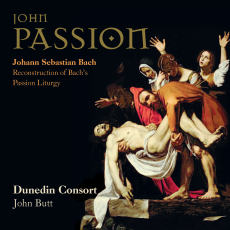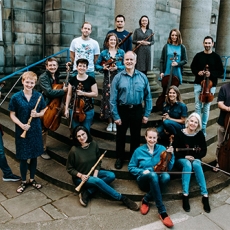John Passion - Dunedin Consort - The Herald
Every so often a performance comes along that is so novel, so radical, that it triggers an entire paradigm shift in the way we understand the great cornerstones of classical music.
Sometimes that novelty comes down to emotional daring or sheer virtuosity; sometimes it's an academic argument that's too persuasive to be ignored. The new recording of Bach's John Passion from Professor John Butt and his Edinburgh-based Dunedin Consort might just be one of the latter.
The John Passion was never meant for the concert hall: it was first performed to a 1000-strong congregation crammed into Leipzig's Nikolaikirche on Good Friday, 1724. The only opera house in town had closed a couple of years earlier, and Bach played to the crowd's appetite with arias of lurid emotionality and testing virtuosity. He never did write an opera, but he knew full well all the tricks of the trade.
The Passion music lasts for two hours (about a third shorter than Bach's later Passion, the Matthew) but it wasn't the whole story back in 1724. Butt has reconstructed the original Good Friday Vespers liturgy, framing Bach's score with organ preludes, congregational chorales, motets and prayers. There's even a selection of sermons available to download from the Linn Records website, ranging from archaic German to Richard Holloway discussing St Peter from a humanistic perspective to Butt himself on the phenomenological experience of music.
The point, he says, is to provide a window into the context in which Bach was working when he composed the Passions. And the view he gives is pretty astonishing. The fundamental architecture and pacing of the Passion changes dramatically. The jubilation of the closing chorale is swept away by a funeral motet, and the opening chorus comes as a brutal shock out of Buxtehude's organ Praeludium in F-sharp (Butt describes this shift from organ to orchestra as "like going from black-and-white TV into colour").
Butt has also used three different choirs to reflect the various levels of singing that Bach would have expected during the service. Dunedin's core singers sing the Passion proper, the Glasgow University Chapel Choir sings the motets, and a large "congregational choir" sings the extra chorales. Such hearty group participation was a key component of Lutheran services -- crucial to ingesting the emotions of the liturgy. And while congregational singing these days generally amounts to dirge, Bach's punters would have held up pretty decently. "The Lutherans were very proud of their singing," Butt explains. "As one Jesuit put it, Luther killed more souls with his chorales than he did with his sermons."
Butt says that what's been particularly interesting for him is the way in which the Passion flows out of and into the other elements of the liturgy without seeming belittled. "Bach's music is not diluted by the simple hymns around it. That is quite a 19th-century, post-Beethovenian view - that the symphony is self-standing and miraculous, and that you mustn't fuzzy its edges. But it's fascinating to hear how the Bach score flows out of another piece [the Buxtehude] almost imperceptibly, but at the same time shockingly perceptibly."
The recording is a significant landmark in authentic Bach performance, but at the same time it's refreshingly relaxed around the edges (Butt doesn't pretend to have recreated the exact 1724 service, because there's no way of knowing what that was). When Dunedin performs the Passion and its liturgy at Bach's baptismal church in Eisenach later this year, it'll be the first such performance in Germany. Closer to home, they tour the Passion around Scotland this week, joined by the Glasgow University Chapel Choir for Thursday's performance at Kelvingrove Museum.
Is Butt tempted to give the Matthew Passion the same treatment? "Tempted, yes- the fascinating question would be whether we'd feel the same dramatic change of pace. The liturgy would be identical, but the Passion music is so much more substantial. We'd be committing ourselves to a good four hours. The great thing about the John Passion is you can do the whole thing, liturgy and all, in a single bladder."

